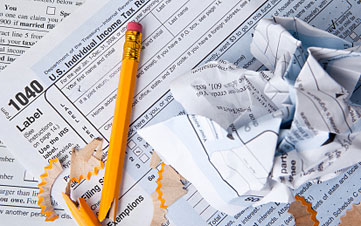7 Innovative Tax Reform Proposals
Tax reform is a lot like the weather.


Profit and prosper with the best of Kiplinger's advice on investing, taxes, retirement, personal finance and much more. Delivered daily. Enter your email in the box and click Sign Me Up.
You are now subscribed
Your newsletter sign-up was successful
Want to add more newsletters?

Delivered daily
Kiplinger Today
Profit and prosper with the best of Kiplinger's advice on investing, taxes, retirement, personal finance and much more delivered daily. Smart money moves start here.

Sent five days a week
Kiplinger A Step Ahead
Get practical help to make better financial decisions in your everyday life, from spending to savings on top deals.

Delivered daily
Kiplinger Closing Bell
Get today's biggest financial and investing headlines delivered to your inbox every day the U.S. stock market is open.

Sent twice a week
Kiplinger Adviser Intel
Financial pros across the country share best practices and fresh tactics to preserve and grow your wealth.

Delivered weekly
Kiplinger Tax Tips
Trim your federal and state tax bills with practical tax-planning and tax-cutting strategies.

Sent twice a week
Kiplinger Retirement Tips
Your twice-a-week guide to planning and enjoying a financially secure and richly rewarding retirement

Sent bimonthly.
Kiplinger Adviser Angle
Insights for advisers, wealth managers and other financial professionals.

Sent twice a week
Kiplinger Investing Weekly
Your twice-a-week roundup of promising stocks, funds, companies and industries you should consider, ones you should avoid, and why.

Sent weekly for six weeks
Kiplinger Invest for Retirement
Your step-by-step six-part series on how to invest for retirement, from devising a successful strategy to exactly which investments to choose.
Tax reform is a lot like the weather. There’s plenty of talk about revamping the tax code, but very little seems to get accomplished. However, in the past few months, both chambers of Congress have held hearings on tax overhaul. And, just this month, President Obama and Paul Ryan, Chairman of the House Budget Committee, each introduced deficit reduction proposals that include tax reform ideas.
There is widespread agreement that the current tax code is too complex (for instance, almost 4,500 changes have been made to the tax code in the last ten years) and provides large subsidies for activities that lawmakers and lobbyists want to favor, such as home ownership, and that the top corporate income tax rate is high relative to other countries around the world.
But there is no consensus on how to fix what ails it. Remember, any reform creates both winners and losers, and the losers will squawk long and hard about losing cherished tax breaks.
As part of the discussion, lawmakers and policy wonks have proposed a number of alternatives for revamping the tax system. Take a look at some of the ideas and our assessment of their chances.

Flat Tax
This proposal calls for a single flat rate tax on income for all taxpayers. Wages, retirement plan distributions and unemployment compensation would be taxed at 17%...19% in the first two tax years. Social Security, interest, dividends and capital gains would be tax exempt.
Taxpayers would get large standard deductions: $30,320 for couples, $19,350 for heads of household and $15,160 for individuals, plus an additional standard deduction of $6,530 for each dependent. Itemized deductions would disappear. Business income, including that of corporations, would also be taxed at 17% (19% in the first two years). The alternative minimum tax and estate and gift tax would be repealed.
Backers of the flat tax cite its simplicity: A single low rate on income and very few deductions. Filing could be as easy as filling out a postcard.
Critics say the flat tax is regressive since all taxpayers, no matter their income, are taxed at the same rate. They also doubt a 17% or 19% tax rate would bring in as much revenue as the current income tax. If a higher tax rate is needed, it would be hard to win public support for the plan.
Chances of passage: Low, unless the tax rate can be kept below 20%.

Changing the Mix by Reducing Tax Breaks and Lowering the Rate
Many tax reform advocates want to keep the current income-based system, but make it less complex, reduce tax rates and collapse tax brackets, and curb many big-ticket tax breaks.
For example, the National Commission on Fiscal Responsibility and Reform set forth the following illustrative plan:
•Collapse the six tax brackets, which currently range from 10% to 35%, into three…12%, 22% and 28%
• Permanently repeal the alternative minimum tax
• End preferential treatment of capital gains and dividends; tax such income at the same rates as salaries
• Retain the earned income and child credits
• Eliminate all itemized deductions; all taxpayers would claim the standard deduction • Allow a 12% tax credit for charitable donations that exceed 2% of adjusted gross income and a 12% credit for home mortgage interest (on mortgages up to $500,000)
• Eliminate or significantly reduce most other tax expenditures
And for corporate taxes, the Commission provides an illustration with a single 28% tax rate, while eliminating most corporate tax expenditures, including the 9% domestic production deduction.
Other like-minded reform ideas that have received significant attention include the proposals set forth in Representative Ryan’s Fiscal Year 2012 Budget Resolution (25% top individual tax rate and 25% flat corporate rate) and the “Bipartisan Tax Fairness and Simplification Act of 2011” proposed by Senators Ron Wyden and Daniel Coats (three individual tax rates…15%, 25% and 35%...and a single corporate rate of 24%).
Chances of passage: Good, but probably not until 2013. Similar reforms that culminated in the Tax Reform Act of 1986 took two years to come to fruition.

Taxpayer Choice: Pick Flat Tax ForeverOr the Status Quo
A handful of House Republicans introduced a bill to give individual and corporate taxpayers a choice: They can stick with the current income tax system, warts and all, or irrevocably elect the flat tax.
Proponents expect most taxpayers to elect the 17% (19% in the first two years) flat tax option since it’s simpler and most would pay a reduced rate of tax.
However, giving taxpayers a choice to elect their poison could also benefit those who believe their federal tax liability would be lower under the current tax system than under a flat tax and who can tolerate the complexity of the tax code. Critics point out that this proposal would bring in far less revenue than the current tax system and would cause deficits to soar.
Chances of passage: Close to zero with the current large deficit.

National Sales Tax
The “Fair Tax” is a national sales tax backed by some Republicans, about half of which are tea partiers, in the House and Senate. Much of the tax code would be scrapped, including both corporate and individual income taxes, estate and gift taxes and payroll taxes.
Instead, a 29.9% sales tax collected only at the retail level would be imposed on the sales of goods and services. Retailers would collect the tax and pass it on to the government.
Although fair tax proponents say the rate is 23%, the tax is actually 23% of the item’s total price, including the tax. When the tax is stated as an add-on percentage to the item’s retail price, like a typical state sales tax paid at the register, the rate is just a hair less than 30%.
Only limited exemptions would be allowed. The tax wouldn’t apply to assets purchased for business or investment use. Tax rebates would be provided, including a stipend for each family equal to 23% of the federal poverty level. Proponents tout the simplicity of the plan. Critics say it’s regressive and the rate is too low to generate necessary federal revenues.
Chances of passage: A real long shot.

Value Added Tax (VAT)
A value added tax (or VAT) is a consumption tax similar to a national sales tax. However, instead of a tax imposed once at the retail level, a smaller rate of tax is imposed each time a product or service is sold or value is added. Take the example of manufactured goods. A tax is applied when the manufacturer sells the goods to a wholesaler and again when the wholesaler passes them on to a retailer.
If a VAT is imposed, the price of goods is expected to rise because the cost would include the built-in tax paid by the seller. That would lead to increased inflation.Representative Ryan has given a nod to a VAT-type approach. Last year, he proposed to repeal the corporate income tax and replace it with an 8.5% tax on business consumption, although he doesn’t propose a VAT in his most recent tax plan.
Chances of passage: Poor.

Adding a National Sales Tax
Some tax reform proponents favor retaining the income-based tax system and supplementing it with a consumption tax, similar to the approach used by many other industrialized countries. This could be tempting to tax writers as a means of raising additional revenue to reduce the deficit.
As part of its tax reform plan, the Debt Reduction Task Force of the Bipartisan Policy Center proposed a supplemental 6.5% national sales tax on goods and services as an additional source of revenue to reduce the federal deficit. This wouldn’t replace the income tax (which would be modified under the plan), but would instead supplement federal revenues.
Businesses would pay tax on their sales, but receive credits for taxes that their suppliers pay when they purchase materials and capital goods from other firms. Final consumers will also pay the tax, but they wouldn’t be able to claim any credits on their purchases.
Chances of passage: Not as remote as you might think, with the federal government awash in a sea of red ink.

Repeal First, Come Up with Something Better Later
This proposal is for those who don’t like the current income tax system, but haven’t yet settled on a better alternative.
The 40-plus Republican co-sponsors of the Tax Code Termination Act want to end our current federal tax system (with the exception of payroll taxes) by December 31, 2015, and use the intervening time to find something else that works.
They don’t yet have a replacement tax proposal, but they know what they want from a new federal tax system:
• Fairness and simplicity
• Low tax rate
• Tax relief for working Americans
• Protection of taxpayer rights and reduction of IRS abuses
• No bias against savings or investment
• Promotion of economic growth and job creation
• No penalty on marriage or families
Chances of passage: Nil. Repealing the tax code without a replacement is putting the cart before the horse.

More from Kiplinger
SLIDE SHOW: How Uncle Sam Spends Your Tax Dollars
QUIZ: How Well Do You Know the Federal Debt and Deficit?
SLIDE SHOW: What a Trillion Dollars Really Buys
Profit and prosper with the best of Kiplinger's advice on investing, taxes, retirement, personal finance and much more. Delivered daily. Enter your email in the box and click Sign Me Up.

Joy is an experienced CPA and tax attorney with an L.L.M. in Taxation from New York University School of Law. After many years working for big law and accounting firms, Joy saw the light and now puts her education, legal experience and in-depth knowledge of federal tax law to use writing for Kiplinger. She writes and edits The Kiplinger Tax Letter and contributes federal tax and retirement stories to kiplinger.com and Kiplinger’s Retirement Report. Her articles have been picked up by the Washington Post and other media outlets. Joy has also appeared as a tax expert in newspapers, on television and on radio discussing federal tax developments.
-
 The New Reality for Entertainment
The New Reality for EntertainmentThe Kiplinger Letter The entertainment industry is shifting as movie and TV companies face fierce competition, fight for attention and cope with artificial intelligence.
-
 Stocks Sink With Alphabet, Bitcoin: Stock Market Today
Stocks Sink With Alphabet, Bitcoin: Stock Market TodayA dismal round of jobs data did little to lift sentiment on Thursday.
-
 Betting on Super Bowl 2026? New IRS Tax Changes Could Cost You
Betting on Super Bowl 2026? New IRS Tax Changes Could Cost YouTaxable Income When Super Bowl LX hype fades, some fans may be surprised to learn that sports betting tax rules have shifted.
-
 Can I Deduct My Pet On My Taxes?
Can I Deduct My Pet On My Taxes?Tax Deductions Your cat isn't a dependent, but your guard dog might be a business expense. Here are the IRS rules for pet-related tax deductions in 2026.
-
 IRS Tax Season 2026 Is Here: Big Changes to Know Before You File
IRS Tax Season 2026 Is Here: Big Changes to Know Before You FileTax Season Due to several major tax rule changes, your 2025 return might feel unfamiliar even if your income looks the same.
-
 2026 State Tax Changes to Know Now: Is Your Tax Rate Lower?
2026 State Tax Changes to Know Now: Is Your Tax Rate Lower?Tax Changes As a new year begins, taxpayers across the country are navigating a new round of state tax changes.
-
 States That Tax Social Security Benefits in 2026
States That Tax Social Security Benefits in 2026Retirement Tax Not all retirees who live in states that tax Social Security benefits have to pay state income taxes. Will your benefits be taxed?
-
 3 Major Changes to the Charitable Deduction for 2026
3 Major Changes to the Charitable Deduction for 2026Tax Breaks About 144 million Americans might qualify for the 2026 universal charity deduction, while high earners face new IRS limits. Here's what to know.
-
 Retirees in These 7 States Could Pay Less Property Taxes Next Year
Retirees in These 7 States Could Pay Less Property Taxes Next YearState Taxes Retirement property tax bills could be up to 65% cheaper for some older adults in 2026. Do you qualify?
-
 Estate Tax Quiz: Can You Pass the Test on the 40% Federal Rate?
Estate Tax Quiz: Can You Pass the Test on the 40% Federal Rate?Quiz How well do you know the new 2026 IRS rules for wealth transfer and the specific tax brackets that affect your heirs? Let's find out!
-
 5 Types of Gifts the IRS Won’t Tax: Even If They’re Big
5 Types of Gifts the IRS Won’t Tax: Even If They’re BigGift Tax Several categories of gifts don’t count toward annual gift tax limits. Here's what you need to know.
